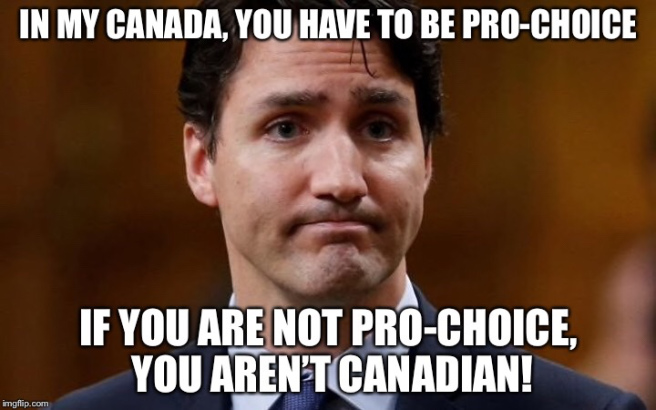If you call yourself Catholic, you’re obliged to believe what Holy Mother Church has always taught – every bit of it – without embracing new ideas that are contrary to what Our Lord taught, and govern yourself accordingly. You can’t be a “cafeteria Catholic”, picking and choosing the items that you deign to accept, and leaving the rest on the buffet.
Logic dictates that if you believe certain moral principles are good rules for you to live by, you should stand up for the application of those same values in society as a whole. If you believe killing babies is wrong, something you wouldn’t do yourself, why would you, in the name of diversity or civil rights or “social justice”, condone the killing of babies by others?
Yet there are many politicians who call themselves Catholics, but reserve their “right” to disregard the teachings of the Church on matters such as abortion or “gender ideology”. Or they say, while I accept what the Church says, I can’t impose my values on others who disagree.
In December 2017, Most Rev. Joseph Naumann, Archbishop of Kansas City, told Catholic World Report that politicians who flaunt being Catholic while asserting that they are also pro-abortion are guilty of misleading other Catholics and must be admonished.
Using as an example former Kansas governor Kathleen Sebelius, Archbishop Naumann said that openly pro-abortion “Catholic” politicians are “particularly problematic” for the bishops to deal with. “We want to presume his or her good will and that he or she is misinformed, and to get him or her to think more carefully and honestly about the issue.”
“Where it is particularly problematic,” he continued, “is when we have Catholic politicians who flaunt their Catholicity, but take positions that our inconsistent with our Catholic teaching…. They teach our people that it is okay to be Catholic and support legalized abortion.”
Archbishop Naumann called Senator Tim Kaine (D-Va) “another example of a politician who flaunted his Catholic background but spewed a lot of pro-choice rhetoric. When they do this,” he said, “they’re taking on a teaching role and misleading our people.”
An example from north of the border is Liberal Member of Parliament Mark Gerretsen, quoted by Father Raymond De Souza, in the National Post, last March as having written an interesting excuse for supporting his government’s insistence that organizations applying for summer jobs grants should promise not to oppose the position of “practising Catholic” Prime Minister Justin Trudeau in favour of “abortion rights” and “LGBTQ rights”. “I’m Catholic,” Mr. Gerretsen told his constituents. “The core mandate of my church is not to infringe upon charter rights.”
Asking applicants for federal funds to sign such a pledge has “nothing to do with their personal beliefs or convictions” but only pertains to “activities”, said Mr. Gerretsen. Father De Souza says that Judas himself may well have been comforted to know that “activities” have “nothing to do” with beliefs or convictions. “All such efforts run up against the clear words of Jesus about Judas: ‘It would have been better for that one never to have been born.’”
The last word goes to the Congregation for the Doctrine of the Faith, which in November of 2002 published Doctrinal Note on some questions regarding The Participation of Catholics in Political Life..
“The history of the twentieth century demonstrates that those citizens were right who recognized the falsehood of relativism, and with it, the notion that there is no moral law rooted in the nature of the human person, which must govern our understanding of man, the common good and the state….
“It is…the Church’s right and duty to provide a moral judgment on temporal matters when this is required by faith or the moral law…. Christians are called to reject, as injurious to democratic life, a conception of pluralism that reflects moral relativism. Democracy must be based on the true and solid foundation of non-negotiable ethical principles, which are the underpinning of life in society.”
It is a grave mistake politicians make when they “adjust” their beliefs to win votes, rather than voting their conscience to do what’s right for society and for their own souls.
Further reading:
“Vatican Double Talk on Pro-Abortion Politicians”, by Christopher A. Ferrara, Fatima Perspectives
“Positions of Catholic Politicians with Regard to Legislation in Favour of Homosexual Unions”, Section IV of Considerations Regarding Proposals to Give Legal Recognition to Unions Between Homosexual Persons, Congregation for the Doctrine of the Faith, July 2003.





